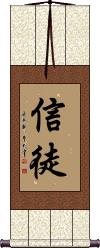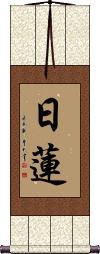Many custom options...
And formats...

Believer in Chinese / Japanese...
Buy a Believer calligraphy wall scroll here!
Personalize your custom “Believer” project by clicking the button next to your favorite “Believer” title below...
Believer
信徒 is the Chinese, Japanese Kanji, and old Korean Hanja word for “believer.”
Just as in English, this word can be used for a follower of virtually any religion.
This word can also be translated into English as layman, adherent, follower, laity, disciple, or devotee.
Nichiren
日蓮 is the title Nichiren.
This title refers to a Buddhist priest who lived from 1222 to 1282. He is the founder of the Nichiren sect of Buddhism.
According to historical documents, the Nichiren sect was established in 1252. Adding the character 宗 for sect, this would be 日蓮宗 (Nichiren sect), which is also known as the 法華宗 or Lotus sect.
According to Soothill-Hodous...
Nichiren's chief tenets are the three great mysteries 三大祕法, representing the trikāya:
1. 本尊 or chief object of worship, being the great maṇḍala of the worlds of the ten directions, or universe, i.e., the body or nirmāṇakāya of Buddha.
2. 題目 the title of the Lotus Sutra 妙法蓮華經 Myo-ho-ren-ge-kyo, preceded by Namo, or “Adoration to the scripture of the lotus of the wonderful law,” for it is Buddha's spiritual body.
3. 戒壇 the altar of the law, which is also the title of the Lotus as above; the believer, wherever he is, dwells in the Pure-land of calm light 寂光淨土, the saṃbhogakāya.
Not the results for Believer that you were looking for?
Below are some entries from our dictionary that may match your Believer search...
| Characters If shown, 2nd row is Simp. Chinese |
Pronunciation Romanization |
Simple Dictionary Definition |
禪 禅 see styles |
shàn shan4 shan yuzuri ゆずり |
More info & calligraphy: Zen / Chan / Meditation(out-dated kanji) (1) (Buddhist term) dhyana (profound meditation); (2) (abbreviation) Zen (Buddhism); (surname) Yuzuri To level a place for an altar, to sacrifice to the hills and fountains; to abdicate. Adopted by Buddhists for dhyāna, 禪 or 禪那, i.e. meditation, abstraction, trance. dhyāna is 'meditation, thought, reflection, especially profound and abstract religious contemplation'. M.W. It was intp. as 'getting rid of evil', etc., later as 靜慮 quiet meditation. It is a form of 定, but that word is more closely allied with samādhi, cf. 禪定. The term also connotes Buddhism and Buddhist things in general, but has special application to the 禪宗 q.v. It is one of the six pāramitās, cf. 波. There are numerous methods and subjects of meditation. The eighteen brahmalokas are divided into four dhyāna regions 'corresponding to certain frames of mind where individuals might be reborn in strict accordance with their spiritual state'. The first three are the first dhyāna, the second three the second dhyāna, the third three the third dhyāna, and the remaining nine the fourth dhyāna. See Eitel. According to Childers' Pali Dictionary, 'The four jhānas are four stages of mystic meditation, whereby the believer's mind is purged from all earthly emotions, and detached as it were from his body, which remains plunged in a profound trance.' Seated cross-legged, the practiser 'concentrates his mind upon a single thought. Gradually his soul becomes filled with a supernatural ecstasy and serenity', his mind still reasoning: this is the first jhāna. Concentrating his mind on the same subject, he frees it from reasoning, the ecstasy and serenity remaining, which is the second jhāna. Then he divests himself of ecstasy, reaching the third stage of serenity. Lastly, in the fourth stage the mind becomes indifferent to all emotions, being exalted above them and purified. There are differences in the Mahāyāna methods, but similarity of aim. |
信徒 see styles |
xìn tú xin4 tu2 hsin t`u hsin tu shinto しんと |
More info & calligraphy: Believerlayman; believer; adherent; follower; laity a believer |
日蓮 日莲 see styles |
rì lián ri4 lian2 jih lien nichiren にちれん |
More info & calligraphy: NichirenNichiren, the Japanese founder, in A. D. 1252, of the 日蓮宗 Nichiren sect, which is also known as the 法華宗 or Lotus sect. Its chief tenets are the three great mysteries 三大祕法, representing the trikāya: (1) 本尊 or chief object of worship, being the great maṇḍala of the worlds of the ten directions, or universe, i. e. the body or nirmāṇakāya of Buddha; (2) 題目 the title of the Lotus Sutra 妙法蓮華經 Myo-ho-ren-gwe-kyo, preceded by Namo, or, 'Adoration to the scripture of the lotus of the wonderful law, ' for it is Buddha's spiritual body; (3) 戒壇 the altar of the law, which is also the title of the Lotus as above; the believer, wherever he is, dwells in the Pure-land of calm light 寂光淨土, the saṃbhogakāya. |
徒 see styles |
tú tu2 t`u tu toumei / tome とうめい |
(bound form) disciple; apprentice; believer; (derog.) wrongdoer (as in 騙徒|骗徒[pian4 tu2] "swindler" or 叛徒[pan4 tu2] "traitor" etc); (bound form) on foot; (bound form) bare; empty; (bound form) to no avail; in vain; (bound form) merely; just; only; (bound form) prison sentence party; set; gang; company; person; (personal name) Toumei On foot; a follower, disciple; in vain; banishment. |
佛子 see styles |
fó zǐ fo2 zi3 fo tzu busshi ぶっし |
(surname) Busshi Son of Buddha; a bodhisattva; a believer in Buddhism, for every believer is becoming Buddha; a term also applied to all beings, because all are of Buddha-nature. There is a division of three kinds: 外子 external sons, who have not yet believed; 度子 secondary sons, Hīnayānists; 眞子 true sons, Mahāyānists. |
來迎 来迎 see styles |
lái yíng lai2 ying2 lai ying raikou / raiko らいこう |
(surname) Raikou The coming of Buddhas to meet the dying believer and bid welcome to the Pure Land; the three special welcomers are Amitābha, Avalokiteśvara, and Mahāsthāmaprāpta. |
信士 see styles |
xìn shì xin4 shi4 hsin shih shinji しんじ |
(1) {Buddh} male lay devotee; (suffix) (2) (title affixed to man's posthumous Buddhist name) (See 信女・2) believer; (3) (しんし only) (archaism) believer; (personal name) Shinji upāsaka, 信事男 a male devotee, who remains in the world as a lay disciple. A bestower of alms. Cf. 優. |
信女 see styles |
xìn nǚ xin4 nv3 hsin nü nobujo のぶじょ |
(1) {Buddh} female lay devotee; (suffix) (2) (title affixed to woman's posthumous Buddhist name) believer; (given name) Nobujo upāsikā. A female devotee, who remains at home. Cf. 優. |
信者 see styles |
xìn zhě xin4 zhe3 hsin che shinja しんじゃ |
(1) believer; adherent; devotee; follower; (2) (colloquialism) fanboy; fanatic; superfan believer |
在教 see styles |
zài jiào zai4 jiao4 tsai chiao |
to be a believer (in a religion, esp. Islam) |
宗徒 see styles |
shuuto / shuto しゅうと |
believer; follower |
帰依 see styles |
kie きえ |
(n,vs,vi) becoming a devout believer; (religious) conversion; (female given name) Kie |
教徒 see styles |
jiào tú jiao4 tu2 chiao t`u chiao tu kyouto / kyoto きょうと |
disciple; follower of a religion believer; adherent a follower |
蓮胎 莲胎 see styles |
lián tāi lian2 tai1 lien t`ai lien tai rentai |
The Lotus-womb in which the believers of Amitābha are born into his paradise; it is also described as the believer's heart in embryo. |
虔信 see styles |
qián xìn qian2 xin4 ch`ien hsin chien hsin |
piety; devotion (to a religion); pious (believer); devout |
門徒 门徒 see styles |
mén tú men2 tu2 men t`u men tu monto もんと |
disciple follower (of religion; esp. Jōdo Shinshū practitioners); believer disciple |
信仰者 see styles |
xìn yǎng zhě xin4 yang3 zhe3 hsin yang che shinkousha / shinkosha しんこうしゃ |
believer believer; devotee; follower; adherent; convert; disciple; admirer |
信奉者 see styles |
shinpousha / shinposha しんぽうしゃ |
adherent; devotee; believer |
信神者 see styles |
xìn shén zhě xin4 shen2 zhe3 hsin shen che |
a believer |
善女人 see styles |
shàn nǚ rén shan4 nv3 ren2 shan nü jen zennyonin ぜんにょにん |
{Buddh} (See 善女) pious woman; female believer good women |
大願船 大愿船 see styles |
dà yuàn chuán da4 yuan4 chuan2 ta yüan ch`uan ta yüan chuan daigan sen |
The great vow boat, i.e. that of Amitābha, which ferries the believer over the sea of mortality to the Pure Land. |
涅槃風 涅槃风 see styles |
niè pán fēng nie4 pan2 feng1 nieh p`an feng nieh pan feng nehan fū |
The nirvāṇa-wind which wafts the believer into bodhi. |
狂信者 see styles |
kyoushinsha / kyoshinsha きょうしんしゃ |
fanatic; fanatic believer; zealot |
篤信者 笃信者 see styles |
dǔ xìn zhě du3 xin4 zhe3 tu hsin che tokushinja |
devout believer |
虔信者 see styles |
qián xìn zhě qian2 xin4 zhe3 ch`ien hsin che chien hsin che |
pious believer; devotee; fundamentalist |
辟支佛 see styles |
bì zhī fó bi4 zhi1 fo2 pi chih fo byakushi butsu |
(辟支迦) (辟支佛陀) (辟支迦佛陀) pratyekabuddha, one who seeks enlightenment for himself, defined in the Lotus Sūtra as a believer who is diligent and zealous in seeking wisdom, loves loneliness and seclusion, and understands deeply the nidānas. Also called 緣覺; 獨覺; 倶存. It is a stage above the śrāvaka 聲聞 and is known as the 中乘 middle vehicle. Tiantai distinguishes 獨覺 as an ascetic in a period without a Buddha, 緣覺 as a pratyekabuddha. He attains his enlightenment alone, independently of a teacher, and with the object of attaining nirvāṇa and his own salvation rather than that of others, as is the object of a bodhisattva. Cf. 畢. |
三尊來迎 三尊来迎 see styles |
sān zūn lái yíng san1 zun1 lai2 ying2 san tsun lai ying sanson raigō |
Amitābha, Avalokiteśvara, Mahāsthāmaprāpta, receive into the western paradise the believer who calls on Amitābha. |
我宗の徒 see styles |
wagashuunoto / wagashunoto わがしゅうのと |
believer of my denomination |
指方立相 see styles |
zhǐ fāng lì xiàng zhi3 fang1 li4 xiang4 chih fang li hsiang shihō rissō |
To point to the west, the location of the Pure Land, and to set up in the mind the presence of Amitābha; to hold this idea, and to trust in Amitābha, and thus attain salvation. The mystics regard this as a mental experience, while the ordinary believer regards it as an objective reality. |
有神論者 有神论者 see styles |
yǒu shén lùn zhě you3 shen2 lun4 zhe3 yu shen lun che yuushinronsha / yushinronsha ゆうしんろんしゃ |
theist (believer in one or more Deities) theist; deist |
Click here for more Believer results from our dictionary
The following table may be helpful for those studying Chinese or Japanese...
| Title | Characters | Romaji (Romanized Japanese) | Various forms of Romanized Chinese | |
| Believer | 信徒 | shinto | xìn tú / xin4 tu2 / xin tu / xintu | hsin t`u / hsintu / hsin tu |
| Nichiren | 日蓮 日莲 | nichi ren / nichiren | rì lián / ri4 lian2 / ri lian / rilian | jih lien / jihlien |
| In some entries above you will see that characters have different versions above and below a line. In these cases, the characters above the line are Traditional Chinese, while the ones below are Simplified Chinese. | ||||
Successful Chinese Character and Japanese Kanji calligraphy searches within the last few hours...





